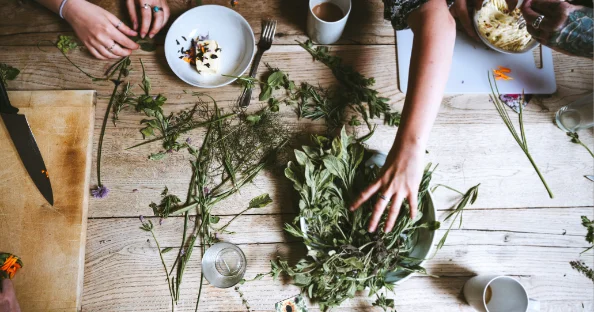Most herbs are easy to grow, and they are even easier to store. The two most common ways to store herbs is by drying them or freezing them. Beyond storing herbs to use them individually later, herbs can also be stored in ready-to-use butters, salts, or oils. With these methods, herb mixtures are ready to be used for cooking, seasoning, or even in homemade bath products.
Drying Herbs
For many herbs, air-drying is the most straightforward method of storage. Drying herbs retains both their flavor and nutrients, but most herbs will lose their color and texture. To dry herbs at home, simply harvest the herb by snipping off each branch off at the base. It is best to harvest herbs before they flower, as this stimulates the plant to create new growth, rather than diverting energy to flowers that will eventually go to seed. Most herbs will yield multiple harvests in one growing season. Tie the stalks together at the base of each branch and hang the bundles in a warm, well-circulated room. It takes about two weeks for the foliage to fully dry out.
The process can be sped up by drying herbs in the oven, but they will cook slightly. Even slight cooking ultimately reduces the final flavor and nutrient density; therefore, the best option is air-drying.
Once the drying process is complete, carefully remove the leaves and store them in an airtight container. For the best flavor, store the leaves whole and crush them right before use. Dried herbs should be stored in a cool, dark place and used within a year. In addition, dried herbs have a more potent flavor; when using dried herbs in a recipe in place of fresh herbs, use one teaspoon of dried herbs for each tablespoon of fresh herbs.
The same drying process can be used to harvest seeds or blooms. For example, cilantro can be harvested after it flowers and the seeds begin to turn from green to brown. The resulting seeds are coriander. Arrange the bundle in the same fashion, but place it so that the seeds can drop into a paper bag as the cilantro dries.
Some tender herbs, like basil, chives, dill, lemongrass, or mint, are too delicate for the drying process and will not tolerate it as well as more rigid herbs. The best choices for dry storage include thyme, rosemary, bay leaf, or coriander seeds.
Freezing Herbs
Fortunately, any herb can be frozen. This technique is especially useful for tender herbs. It is also a good option when the appearance of the herb is important. Dried herbs will lose their color, but frozen herbs that are blanched before they are frozen will maintain their color and flavor.
To blanch, submerge the herb in boiling water and swish it around for no more than 30 seconds, then transfer it to an ice bath. Roll the herb up in a towel and press out as much water as possible. Strip the leaves and place them in a food processor. Pulverize the leaves, then add extra virgin olive oil or water until there is roughly equal parts liquid to herb. Pour the mixture into an ice cube tray and freeze overnight, then transfer the herb cubes into a freezer bag for storage. This method allows you to save portions of individual or combinations of herbs that can be used in soups, stir-fries, pressure-cooker meals, or roasts. When the whole leaf is desired, forego the food processor, and place the whole leaves into freezer bags after blanching and drying them.
Ginger is an exception. The rhizomes can be finely chopped and stored in freezer bags, or the rhizome can be stored whole. Simply use a grater to add ginger to dishes.
Infusing Herbs into Butters, Oils, and Salts
Herbs can also be stored as infused oils, butters, or salts, creating flavor-packed, ready-to-use seasonings. To make an infused oil, place 1/4 cup of leaves from the herb of choice into a small saucepan. Add 1 cup of extra virgin olive oil. Cook over low heat until the oil is warm. As soon as bubbles begin to rise to the surface of the oil, turn off the heat. Do not allow the oil to get hot enough that it smokes or simmers. Allow the herb to steep in the oil for about an hour. Strain the oil into bottles that can be sealed tightly. The infused oil can be stored at room temperature for 2 months.
Herbal infusion is not a good choice for storing tender herbs that will not withstand the heat, but it is an excellent choice for the same rigid crops that tolerate dried storage. Experiment with infusions of thyme, peppermint, lemon balm, lavender, chamomile, or calendula.
Herb salts make great seasonings for veggies, rubs for meat, or added flavor to dips and salad dressings. To make an herb salt, mix 4 parts of minced herb to 1 part kosher salt. Store it in an airtight container. Herb salts can be stored indefinitely, provided they are kept in a cool, dark place. However, they may lose their potency over time.
Herb butters can be used anywhere that plain butter would be used. Try them on toasted bread, on a pan-seared steak, or over roasted vegetables. To make an herb butter, mash together herbs and unsalted butter until they are well mixed. Add anywhere from 1 to 3 teaspoons of herbs per stick of butter (1/2 cup). There is really no wrong way to make herb butter; it is purely based on taste. Experiment with different herb combinations, add salt and pepper, or try some lemon zest.
Shape the butter mixture into a log and wrap it in plastic wrap. Using the edges of the plastic, gently roll the butter, working inward until the butter is a neat, tightly-wrapped cylinder. Place the wrapped butter into another bag and seal it tightly. Once the butter is chilled, it is easy to slice off the desired amount. Herb butter can be refrigerated for 2 months or frozen for up to 6 months. Frozen butter should be thawed 24 hours in advance. Beyond 6 months, the butter will still be usable, but will likely lose its flavor.
For those who enjoy cooking and experimentation, herb storage can be a great opportunity to try out different flavor combinations. Each storage technique is easy to master, even for kitchen novices. Whether they are dried, frozen, or infused, stored herbs can add brilliant flavor to any dish. Successfully storing herbs allows anyone to enjoy the fresh flavor of fresh crops regardless of the season.


Recent Comments